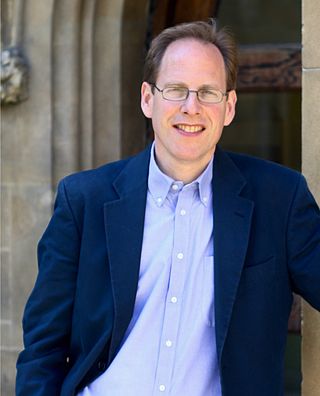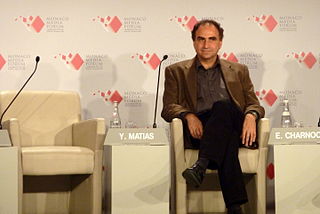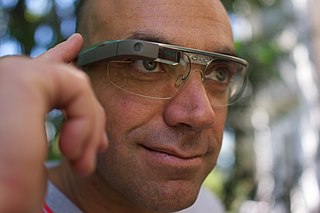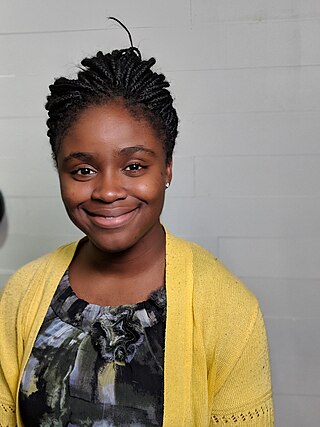Related Research Articles
The Lemelson–MIT Program awards several prizes yearly to inventors in the United States. The largest is the Lemelson–MIT Prize which was endowed in 1994 by Jerome H. Lemelson, funded by the Lemelson Foundation, and is administered through the School of Engineering at the Massachusetts Institute of Technology. The winner receives $500,000, making it the largest cash prize for invention in the U.S.

Face detection is a computer technology being used in a variety of applications that identifies human faces in digital images. Face detection also refers to the psychological process by which humans locate and attend to faces in a visual scene.

Sir Simon Philip Baron-Cohen is a British clinical psychologist and professor of developmental psychopathology at the University of Cambridge. He is the director of the university's Autism Research Centre and a Fellow of Trinity College.

The neurodiversity paradigm is a framework for understanding human brain function that recognizes the diversity within sensory processing, motor abilities, social comfort, cognition, and focus as neurobiological differences. This diversity falls on a spectrum of neurocognitive differences. The neurodiversity paradigm argues that diversity in human cognition is normal and that some conditions generally classified as disorders, such as autism, are differences and disabilities that are not necessarily pathological. Neurotypical individuals are those who fall within the average range of functioning and thinking.

Daphne Koller is an Israeli-American computer scientist. She was a professor in the department of computer science at Stanford University and a MacArthur Foundation fellowship recipient. She is one of the founders of Coursera, an online education platform. Her general research area is artificial intelligence and its applications in the biomedical sciences. Koller was featured in a 2004 article by MIT Technology Review titled "10 Emerging Technologies That Will Change Your World" concerning the topic of Bayesian machine learning.

In psychology and sociology, masking, also known as social camouflaging, is a defensive behavior in which an individual conceals their natural personality or behavior in response to social pressure, abuse, or harassment. Masking can be strongly influenced by environmental factors such as authoritarian parents, social rejection, and emotional, physical, or sexual abuse. Masking can be a behavior individuals adopt subconsciously as coping mechanisms or a trauma response, or it can be a conscious behavior an individual adopts to fit in within perceived societal norms. Masking is interconnected with maintaining performative behavior within social structures and cultures.

Rosalind Wright Picard is an American scholar and inventor who is Professor of Media Arts and Sciences at MIT, founder and director of the Affective Computing Research Group at the MIT Media Lab, and co-founder of the startups Affectiva and Empatica.

Mel Baggs, was an American non-binary blogger who predominantly wrote on the subject of autism and disability. At times, Baggs used a communication device to speak and referred to themself as a low-functioning autistic. Revelations about Baggs's past created some uncertainty about their diagnosis.

Smart Eye AB, is a Swedish artificial intelligence (AI) company founded in 1999 and headquartered in Gothenburg, Sweden. Smart Eye develops Human Insight AI, technology that understands, supports and predicts human behavior in complex environments. Smart Eye develops and deploys several core technologies that help gain insights from subtle and nuanced changes in human behavior, reactions and expressions. These technologies include head tracking, eye tracking, facial expression analysis and Emotion AI, activity and object detection, and multimodal sensor data analysis.

Andrew Yan-Tak Ng is a British-American computer scientist and technology entrepreneur focusing on machine learning and artificial intelligence (AI). Ng was a cofounder and head of Google Brain and was the former Chief Scientist at Baidu, building the company's Artificial Intelligence Group into a team of several thousand people.

Trueman Bradley is a fictional character in a series of detective novels written by Alexei Maxim Russell. Bradley is characterized as a genius detective with Asperger syndrome.

Yossi Matias is an Israeli-American computer scientist, entrepreneur and Google executive. Matias is Vice President, Engineering & Research at Google, and the founding managing director of Google's Center in Israel. He is on the leadership team of Google's Research, the global exec lead overseeing Google’s Health AI, Crisis Response and Climate AI efforts, and leads efforts in Conversational AI. For over a decade he was on the leadership team of Google’s Search, building and leading efforts including Google Trends, Google Autocomplete, Search Console, and Search experiences in weather, sports, dictionaries and more. In 2024 Matias move to Silicon Valley to head Google Research, the company’s global research activity.
Autism-friendly means being aware of social engagement and environmental factors affecting people on the autism spectrum, with modifications to communication methods and physical space to better suit individuals' unique and special needs.
Affectiva is a software development company that created artificial intelligence. In 2021, the company was acquired by SmartEye. The company claimed its AI understood human emotions, cognitive states, activities and the objects people use, by analyzing facial and vocal expressions. The offshoot of MIT Media Lab, Affectiva created a new technological category of Artificial Emotional Intelligence, namely, Emotion AI.

An optical head-mounted display (OHMD) is a wearable device that has the capability of reflecting projected images as well as allowing the user to see through it. In some cases, this may qualify as augmented reality (AR) technology. OHMD technology has existed since 1997 in various forms, but despite a number of attempts from industry, has yet to have had major commercial success.

Hao Li is a computer scientist, innovator, and entrepreneur from Germany, working in the fields of computer graphics and computer vision. He is co-founder and CEO of Pinscreen, Inc, as well as associate professor of computer vision at the Mohamed Bin Zayed University of Artificial Intelligence (MBZUAI). He was previously a Distinguished Fellow at the University of California, Berkeley, an associate professor of computer science at the University of Southern California, and former director of the Vision and Graphics Lab at the USC Institute for Creative Technologies. He was also a visiting professor at Weta Digital and a research lead at Industrial Light & Magic / Lucasfilm.

Megvii is a Chinese technology company that designs image recognition and deep-learning software. Based in Beijing, the company develops artificial intelligence (AI) technology for businesses and for the public sector.

Finale Doshi-Velez is a computer scientist and the John L. Loeb Professor of Engineering and Applied Sciences at Harvard University. She works on machine learning, computational statistics and healthcare.

Jessica L. Benham is an American politician and disability rights activist serving as a member of the Pennsylvania House of Representatives for the 36th District. She is the first openly LGBTQ+ woman and first openly autistic person elected to the Pennsylvania General Assembly. She cofounded the Pittsburgh Center for Autistic Advocacy in 2014.

Inioluwa Deborah Raji is a Nigerian-Canadian computer scientist and activist who works on algorithmic bias, AI accountability, and algorithmic auditing. Raji has previously worked with Joy Buolamwini, Timnit Gebru, and the Algorithmic Justice League on researching gender and racial bias in facial recognition technology. She has also worked with Google’s Ethical AI team and been a research fellow at the Partnership on AI and AI Now Institute at New York University working on how to operationalize ethical considerations in machine learning engineering practice. A current Mozilla fellow, she has been recognized by MIT Technology Review and Forbes as one of the world's top young innovators.
References
- 1 2 Schwartz, Saira Hussain, Cara Gagliano, and Adam (2020-08-11). "Victory! Court Orders CA Prisons to Release Race of Parole Candidates". Electronic Frontier Foundation. Retrieved 2024-06-11.
{{cite web}}: CS1 maint: multiple names: authors list (link) - 1 2 Metz, Cade (2019-07-17). "Google Glass May Have an Afterlife as a Device to Teach Autistic Children". The New York Times. ISSN 0362-4331 . Retrieved 2024-06-11.
- 1 2 "Checking your browser". www.f6s.com. Retrieved 2024-06-11.
- 1 2 Forristal, Lauren (2023-09-07). "AI reading coach startup Ello raises $15M to bolster child literacy". TechCrunch. Retrieved 2024-06-11.
- 1 2 3 4 "About Us". www.ello.com. Retrieved 2024-06-11.
- 1 2 "Catalin Voss | Lemelson". lemelson.mit.edu. Retrieved 2024-06-11.
- 1 2 Palmer, Ross (2021-10-08). "Catalin Voss: Founder of Ello and Silicon Valley Social Entrepreneur". Ross Palmer. Retrieved 2024-06-11.
- 1 2 Tanner, Adam (2017-06-14). "19-Year-Old Teaching Your Laptop to Pick Up Your Feelings". Pacific Standard. Retrieved 2024-06-11.
- 1 2 "Epicenter: Story - Changing the Way We Use Technology". epicenter.stanford.edu. Retrieved 2024-06-11.
- ↑ Stanford 125 (2016-07-28). "Scaling autism's walls: Catalin Voss". Stanford 125. Retrieved 2024-06-11.
{{cite web}}: CS1 maint: numeric names: authors list (link) - 1 2 "Voss '16 respected in Silicon Valley, founded Sension startup". 2013-10-01. Retrieved 2024-06-11.
- ↑ "(GAIA Systems Solutions Inc. Archived 2015-11-23 at the Wayback Machine. Retrieved 8 November 2015.)".
- ↑ "Google Glass lives on as a device to teach autistic children | Wu Tsai Neurosciences Institute". neuroscience.stanford.edu. 2023-10-23. Retrieved 2024-06-11.
- ↑ University, Stanford. "Autism Glass Project". autismglass.stanford.edu. Retrieved 2024-06-11.
- ↑ Metz, Cade. "Clinical Trial Will Test if Google Glass Can Help Kids with Autism". Wired. ISSN 1059-1028 . Retrieved 2024-06-11.
- ↑ "Google Glass could change the way autistic kids read faces". Associated Press. 2016-06-23. Retrieved 2024-06-11.
- ↑ "The Wall Lab | Congratulations to Autism Google Glass team for Best Poster award". wall-lab.stanford.edu. Retrieved 2024-06-11.
- ↑ digitale@stanford.edu, <img src='https://med stanford edu/news/media-contacts/erin_digitale/_jcr_content/image img 620 high jpg/digitale-erin-90 jpg' alt='Erin Digitale' /> Erin Digitale Erin Digitale is a senior science writer in the Office of Communications Email her at (2017-05-08). "Google Glass helps kids with autism read facial expressions". News Center. Retrieved 2024-06-11.
{{cite web}}:|first=has generic name (help)CS1 maint: numeric names: authors list (link) - ↑ "Stanford Medicine licenses Google Glass-based autism tech to Cognoa". MobiHealthNews. 2019-04-10. Retrieved 2024-06-11.
- ↑ "x.com". X (formerly Twitter). Retrieved 2024-06-11.
- ↑ "Mastercard: Diligent About Digital In Africa". www.forbesafrica.com. 2019-09-02. Retrieved 2024-06-11.
- ↑ "Is Natural Language Processing Ready to Take on Legal Hearings?". hai.stanford.edu. 2021-05-03. Retrieved 2024-06-11.
- ↑ "THE RECON APPROACH: A NEW DIRECTION FOR MACHINE LEARNING IN CRIMINAL LAW" (PDF).
- ↑ "Petition - Voss v. CDCR". Electronic Frontier Foundation. 2020-08-10. Retrieved 2024-06-11.
- ↑ "About". Press Releases for Readers of Times of San Diego. Retrieved 2024-06-11.
- ↑ "Ello". Y Combinator's Work at a Startup. Retrieved 2024-06-11.
- ↑ Staff, eSchool News (2023-11-27). "Ello, World's Most Advanced AI Reading Coach Recognized by Common Sense Media as Top AI Tool". eSchool News. Retrieved 2024-06-11.
- ↑ "Ello is using AI to write hundreds of e-books to help kids learn to read".
- ↑ "Ello Leverages GenAI to Launch the Largest Catalog of Science of Reading Aligned E-Books". Yahoo Finance. 2024-01-23. Retrieved 2024-06-11.
- ↑ "Ello is using AI to write hundreds of e-books to help kids learn to read".
- ↑ "Top San Francisco Bay Area, CA Kids + Family Companies 2024 | Built In San Francisco". www.builtinsf.com. Retrieved 2024-06-11.
- ↑ "Announcement of the 2019 Fellowship Awardees and Highlights from the Google PhD". research.google. Retrieved 2024-06-11.
- ↑ "Voss Fact Sheet" (PDF).
- ↑ "Stanford seniors' thesis projects garner university medals". news.stanford.edu. Retrieved 2024-06-11.
- ↑ "Catalin Voss". Forbes. Retrieved 2024-06-11.
- ↑ Robinson, Melissa Stanger, Melia. "40 Under 40: People To Watch In 2015". Business Insider. Retrieved 2024-06-11.
{{cite web}}: CS1 maint: multiple names: authors list (link)